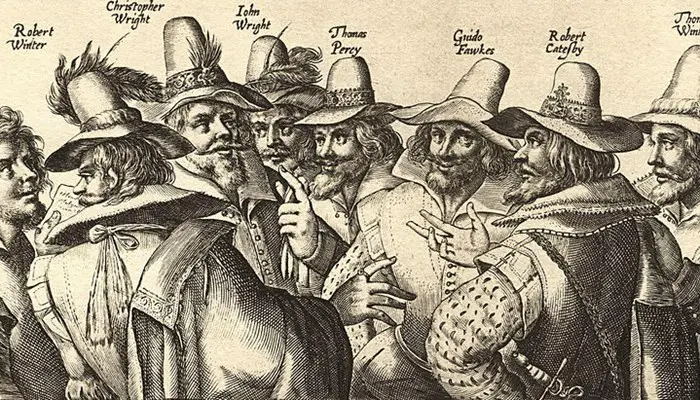Buy this advertising space
my.britevents.com/adsThis ad costs just £0.001 per page. Can you afford NOT to buy this advert?

my.britevents.com/adsThis ad costs just £0.001 per page. Can you afford NOT to buy this advert?

redletterdays.comIrresistable gifts, including short breaks, thrills, attractions, adventure and gifts.

www.booking.comSave up to 40% off UK hotel rooms. The perfect weekend getaway.
BritEvents has a brief look at the history behind the infamous Guy Fawkes, the man, his failed Gunpowder Plot of 5th November 1605, and why the people of Britain still celebrate this day more than four centuries later.

For the past four centuries, fireworks have illuminated the skies and bonfires have burned in the fields of Britain every year on November 5th.
The reason behind this tradition lies in the dark history between England's Catholics and Protestants in the sixteenth and seventeenth centuries. Queen Elizabeth I, a Protestant, had been persecuting the Catholics of the country for over 50 years. When she died in 1603, they hoped that the suffering they had endured during her reign would end. However, the situation didn't improve when her successor took the throne; James I was just as intolerant of their religion, if not more so.
Robert Catesby was a Catholic who had become exasperated and wanted to see the end of the Protestant rule. He convinced twelve other like-minded men to join him in restoring a Catholic monarch to the English throne. Together, they conspired to assassinate the King, his family and many prominent Government leaders by blowing up the Houses of Parliament during the State Opening on 5th November 1605. During the weeks preceding the opening, they managed to stash more than twenty barrels of gunpowder (some say 36) in the cellars underneath the House of Lords.
A man named Guy Fawkes was recruited to execute the plan and the King by detonating the gunpowder on the day. This decision sealed Fawkes's place in British history as the most famous conspirator of the Gunpowder Plot. Unfortunately for him, an anonymous letter had alerted the authorities and Fawkes was caught in the early hours of the morning, inside the cellars of Parliament with the barrels of gunpowder and a slow match. His name immediately became synonymous with the 'Powder Treason', as it was known at the time.
Fawkes was arrested on the spot. At first, he protested his innocence (despite being caught red-handed) and mentioned nothing about the Plot until he was eventually broken by severe torture. After he finally revealed the names of this fellow plotters, they were all tried, found guilty of high treason, and executed.
King James was ecstatic that the plan had been foiled and declared November 5th a day of celebration. Bonfires were lit across London that very night. Over the years, people began making effigies of Fawkes, known as 'Guys', and throwing them onto their fires. Soon fireworks displays were added to the celebrations. The people of Britain have carried on the tradition to this day, and the cellars of Parliament are still searched before the State Opening every year. November 5th is now known as Bonfire Night, Fireworks Night and of course, Guy Fawkes Day after its most notorious traitor.
Nowadays, Fawkes has become something of a national hero. The English jokingly wonder whether we are actually celebrating his capture, or honouring his brazen attempt to eradicate the Government. Guy Fawkes has even been referred to as 'The only man ever to enter Parliament with honest intentions'.